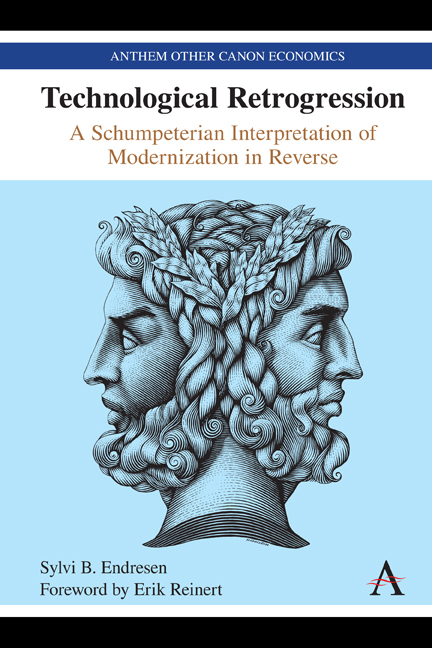Book contents
- Frontmatter
- Dedication
- Contents
- List of Figures
- Foreword
- Acknowledgements
- Preface: The Book within This Book
- Introduction: The Concept of Technological Retrogression
- 1 Challenging Linearity and Irreversibility
- 2 Perspectives on Technological Heterogeneity
- 3 Production Systems and Work Histories
- 4 Empirical Evidence of Technological Retrogression: The Sri Lankan Case
- 5 Empirical Evidence of Technological Retrogression: The Malaysian Case
- 6 A Theory of Technological Retrogression
- References
- Index
6 - A Theory of Technological Retrogression
Published online by Cambridge University Press: 17 June 2021
- Frontmatter
- Dedication
- Contents
- List of Figures
- Foreword
- Acknowledgements
- Preface: The Book within This Book
- Introduction: The Concept of Technological Retrogression
- 1 Challenging Linearity and Irreversibility
- 2 Perspectives on Technological Heterogeneity
- 3 Production Systems and Work Histories
- 4 Empirical Evidence of Technological Retrogression: The Sri Lankan Case
- 5 Empirical Evidence of Technological Retrogression: The Malaysian Case
- 6 A Theory of Technological Retrogression
- References
- Index
Summary
It is time to assemble the building blocks and present a theory of technological retrogression. Lessons learned from the empirical studies are presented first, forming the basis of a discussion on economic structures, the nature of capitalism manifested. I conclude that the transition to capitalism is frozen, supporting the dependency theory stance of peripheral capitalism: Lacking diversification of the economy at large partly explains the lock- in found in the cases analysed and thus reproduction of ancient production system relations. These insights are used to confront the evolutionism of both classical and Marxist modernization theory: Modernization may reverse, irreversibility is an empirical question, not a dogma. The process of technological retrogression is finally sought interpreted in Schumpeterian terms: Retrogressive economic dynamics are at work simultaneously with the progressive dynamics described in Schumpeter's theory. While the progressive dynamics result in technological progress and ultimately prosperity, retrogressive dynamics pushes producers into deepening poverty. The result is economic and social polarization.
Changes and continuity in the fishing villages
The fishing villages witnessed an immense technological polarization, which was reinforced by technological retrogression. The accompanying socioeconomic polarization, increased by the opening of the village society through market expansion, led to sociocultural changes which should be studied with better tools than mine. The changes, however, have been fundamental. It can be argued that the price of economic growth was the breakdown of ancient social values: The share systems now promote social inequality, and absentee ownership has been introduced, reducing local control over production. The fisherfolk are now part of larger and even more complex systems: larger external markets and increasing scale of the fishing operations.
Before the inflow of modern Western technologies, the fishing communities were characterized by low level of productivity and a relatively equal surplus distribution, resulting in limited capital formation. Even if the total surplus were reinvested in productive activities, technological modernization based on locally accumulated capital would have been slow. Increased demand spurred non- local investors’ interest in the exploitation of the fish resources. In Malaysia this resulted in a massive investment in modern technology. These industrial technologies have, however, not eradicated the artisanal; to the contrary, technological heterogeneity continued and deepened and were reinforced by the processes which reproduce artisanal technology. There was a high degree of heterogeneity in the villages studied.
- Type
- Chapter
- Information
- Technological RetrogressionA Schumpeterian Interpretation of Modernization in Reverse, pp. 189 - 216Publisher: Anthem PressPrint publication year: 2021



